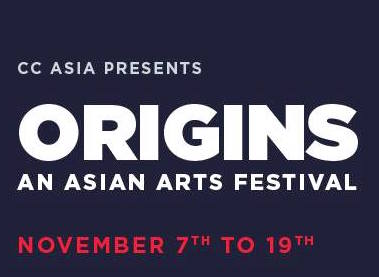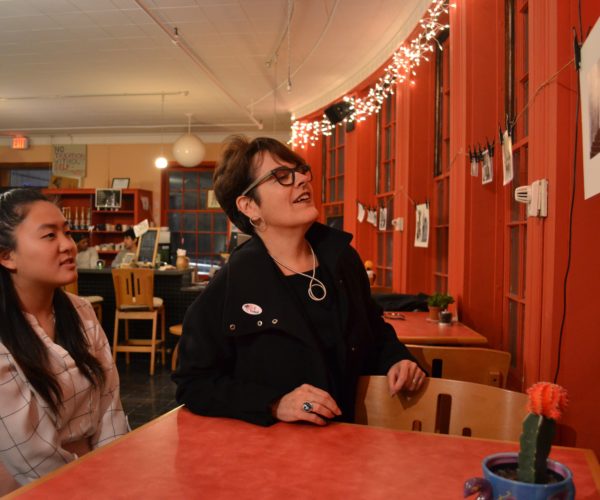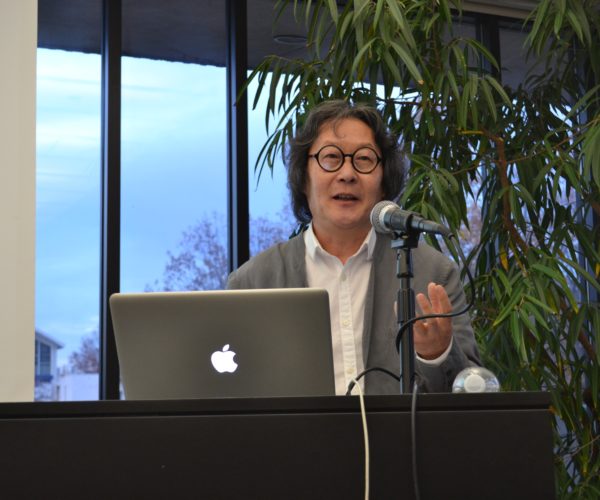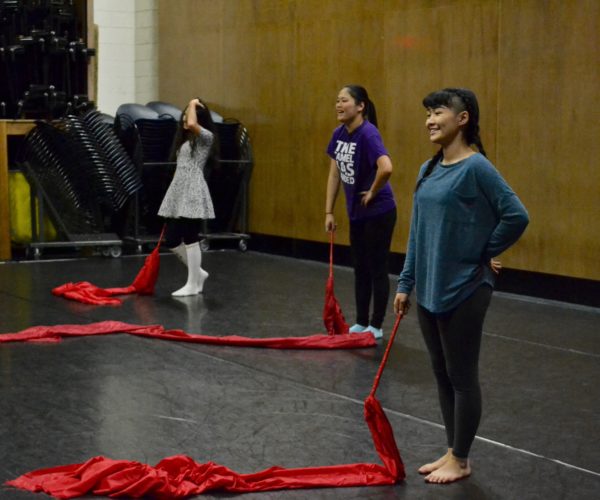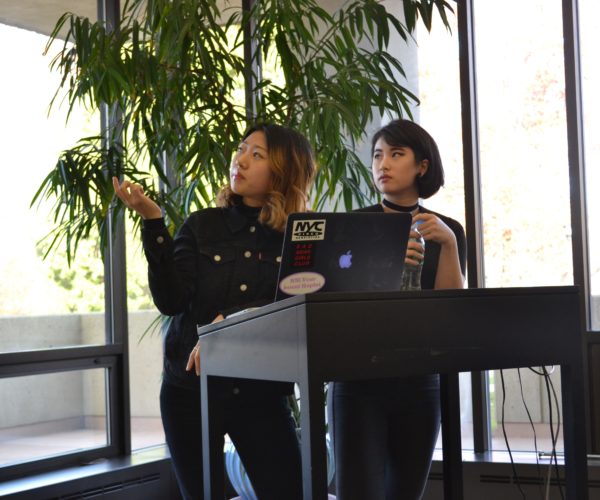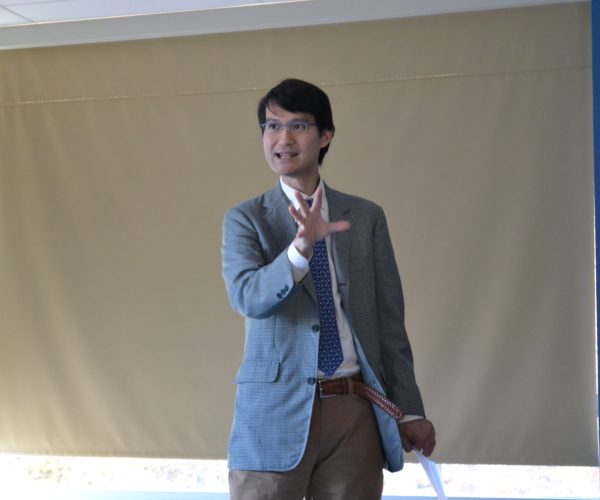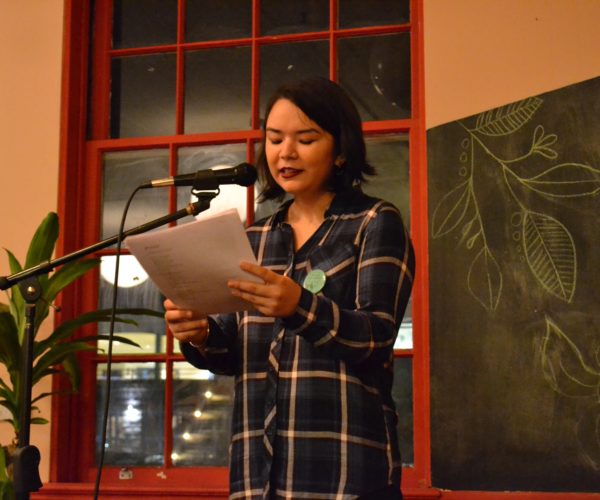From Nov. 18 to Nov. 19, Conn’s Asian Students in Action (A.S.I.A.), formerly CCASA, held their first ever two-week Asian arts festival, “ORIGINS,” as an alternative to the organization’s annual dance show, “Fusion.” ORIGINS included a wide array of events, such as a student art exhibition in Coffee Grounds, a Chinese Ribbon Dance workshop, a talk by RISD seniors Esther Fan and Olivia Park (creators of the Sad Asian Girls Club), an activist Asian femme art collective and a lecture by famous Chinese contemporary artist Xu Bing.
The College Voice had a chance to talk to A.S.I.A. co-presidents, Elissa Webb ’17 and Devon Stahl ’19 about the festival and the organization’s plans for the future.
TCV: How do you think the 2-weeks art festival went? Were you two satisfied with the outcome?
Devon Stahl: Provided that ORIGINS is an entirely new event for A.S.I.A., as well as an event which takes the place of quite a 10+ year tradition at Conn, I personally feel happy with the festival and its purpose. ORIGINS isn’t meant to so much replace Fusion, as it was to completely reinvent and challenge how Asian and Asian Americans were culturally represented at Connecticut College. I recognize the challenges which come with trying to establish new traditions, to explore uncharted territory. So I recognize this year, the general outcome of ORIGINS would really determine its continuation next year. I personally think A.S.I.A. provided a strong outline and base if we did host another ORIGINS. Am I fully satisfied with ORIGINS? No, and I’m going to be honest here: I / we / A.S.I.A. completely failed to reach out and include non-East Asian art, artists, and representation. It’s inexcusable that A.S.I.A. should claim to provide “Asian and Asian American” representation, when in reality the only representation was East Asian. Committing to highlighting non-East Asian work is my main concern for any future festivals. Overall, what excites me the most is the flexibility the festival-concept provides A.S.I.A! The fresh and rootless nature of ORIGINS opens up endless possibilities for Asian and Asian American students’ expression on campus. ORIGINS isn’t so much about the history of Asians and Asian Americans, but an chance to explore new origins of identity and to challenge outdated concepts of what it means to be Asian in America.
Elissa Webb: I think that the festival went really well! I really enjoyed the collaborations that we got to do; we co-sponsored or collaborated on events with Eclipse, QPOC+, Coffee Grounds, the Language Fellows, the Chu-Griffis Asian Art Collection, CISLA, Art History & Architectural Studies, Art and the Ammerman Center.
There was definitely room for improvement: I think we needed better communication with administrators and departments on campus. We had low attendance at a couple of events, so teaming up with other groups for advertising is important in the future. I’d also like to echo Devon’s concerns about representation. While we did have some representation of Southeast Asia, the vast majority of our events focused on East Asia (or East Asian-Americans).
TCV: Which event do you think attendees enjoyed the most?
DS: The Food Making Workshop was definitely the most popular! It was held in Unity House’s kitchen on Thursday. The workshop was facilitated by ASIA members and Dot Wang from Career Services. Around 30-35 students came to learn how to hand-make fried wontons, onigiri (rice balls), wonton soup and steamed vegetable buns. Many of the attendees were not part of A.S.I.A. and it was wonderful to see new faces.
EW: The food making workshop was really popular, which was a little unexpected. We also had really good audience responses for Ally Ang’s spoken word performance and the Sad Asian Girls artist visit.
TCV: “Fusion” has been an annual dance festival at Conn for about 10+ years. This year the organization decided to have ORIGINS in lieu of the dance show. Was it nerve-racking to decide to not have Fusion this year and try something new?
DS: Yes. It was an extremely contested decision within the organization. We started seriously discussing the possibility of discontinuing Fusion early spring semester (2016). Countless meetings were focused on discussing the pros, the cons, and the what ifs of not producing Fusion. We looked at logistical issues, cultural issues and representation issues of the dance show. I should mention the first conversations surrounding changes to Fusion were mainly about ways to improve the entire process (how choreographers are recruited, who choreographs, who is dancing, how the pieces represent its respective culture). It became increasingly clear that the dance show itself no longer honestly and accurately represented Asian culture. Obviously, Asian and Asian American identity extends well beyond shiny, colorful costumes and culturally-specific dances. But a one-night performance doesn’t offer the campus the full diversity within Asian and Asian American representation. The entire structure didn’t provide for any other representation of Asian persons than dance. Ultimately, A.S.I.A. decided to not do Fusion at all and instead, looked towards a more individualistic, self-determined representation of Asians and Asian Americans. It came down to: students in A.S.I.A. were uncomfortable with how their own identity was being presented on campus in a tokenizing, narrow fashion. We knew we couldn’t control how non-Asian/Asian American students perceived the show, but we did know we had the power to determine how we represent ourselves.
EW: I was definitely nervous about not doing Fusion this year! Fusion was very predictable: it cost the same year to year and we could depend on having an audience. It’s been a tradition for nearly 20 years, so we were also concerned that our alumni would be upset. I really loved the show, even with all its flaws, and it’s been a labor of love for me as technical director and producer for the past two years. That said, I think that we made the right decision. Over the years, the show became increasingly problematic and disconnected from its goals of educating and entertaining. It had become something of a chore for the club, and our members weren’t excited about putting it on. The majority of participants and audience weren’t from the Asian or Asian-American community here at Conn. While we seek to be inclusive and educate non-Asians, our mission prioritizes Asians and Asian Americans on campus.
TCV: Will you plan on doing the same event next year and will it become a new A.S.I.A. tradition?
DS: As I previously mentioned, ORIGINS this year was a bit of a test run (as all new things are). I personally would like to see where A.S.I.A. could take ORIGINS next year, possibly in an entirely new direction beyond the arts. But as for officially deciding on whether or not to continue the festival, it’s really up to the whole organization. We’ll definitely be reflecting and asking for feedback on the last two weeks! I think traditions are only worth preserving as long as they continue to have purpose and relevance. In the early 2000s, A.S.I.A. consisted of predominantly South Asian men, and Fusion offered the perfect platform for celebrating Diwali and South Asian dance on campus. But club demographics change, and some traditions become detrimental rather than empowering. So, as long as ORIGINS remains aligned with A.S.I.A.’s general mission to advocate for Asian and Asian American issues, representation, and cultural understanding, the festival could very well become an A.S.I.A. tradition.
EW: I’m inclined to say yes, but there will definitely be some changes after conversations about what worked and what didn’t. We’re interested in holding a similar series of events in April for Asian American & Pacific Islander Heritage Month under the theme “Asians in Activism.” I’m graduating this year, so it’s not up to me, but I’d be excited to see another arts festival next November!

